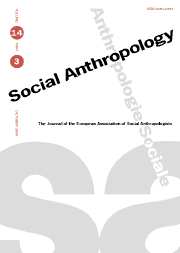No CrossRef data available.
Article contents
Anthropology. The paradox of the secular
Published online by Cambridge University Press: 26 October 2001
Extract
Secularism defines the orientation of most contemporary thought in the philosophies and social sciences. So much an outgrowth of the European Enlightenment, their secularism manifests the potency of human thought finally liberated and liberating, a demythologizing force that replaces God with Man, that sees human beings as the architects of their own destinies. This is the thoroughgoing argument of the discipline of anthropology regardless of conceptual or methodological orientation. Secularism also declares knowledge, all branches of valid knowledge to be grounded in rationality, a rationality guided by the rule of reason and usually that defined in European and North American Enlightenment and Post-Enlightenment discourses. Here the commitment of anthropology is less certain and considerably divided. What constitutes reason and rationality is at the root of much anthropological endeavour and the history of debate over theory and method in the discipline resounds with its irresolution. In many ways the dominating figure of Kant looms over anthropological discourse (even in his current Nietzschean extension or rejection) but there is a deep suspicion as to whether ideal or transcendental reason is independent of its daily or ordinary articulations in routine practices. In other words, abstract reason is always directed and filled with cultural assumptions constructed in the dynamics of a contemporary history. All reason and rationality is of this order. Scientific or logical Reason is no exception and anthropologists argue the problematics of this fact when applied to the rigorous exploration and understanding of human practices which are formed in different historical and cultural circumstances. Such a problematic is compounded in a view, held by many anthropologists, that all human beings are in one way or another authorities as to what is the nature and meaning of being human. In other words, the authority does not rest with any particular and historically specifically located body of human beings, no matter how politically, economically or technologically dominant. In fact, forms of practical knowledge or reason constructed in such contexts of dominance may distort and subdue other forms of practical knowledge that otherwise may yield understanding of both a specific and more general nature. Louis Dumont's annoying point, anathema to many, but a development from the great Marcel Mauss, is that the mythologised realities of an India of his investigation refuse comprehension through the individualistic terms of a European modernism. Simultaneously, serious attention to such Indian discourse (perhaps most tragically revealed in the very crisis of its colonial demythologisation or securalisation) provides insight into the nature of colonial structurings and the kinds of reconfigurations of the human subject underway in recent European and North American history.
- Type
- Dossier
- Information
- Copyright
- © 2001 European Association of Social Anthropologists


